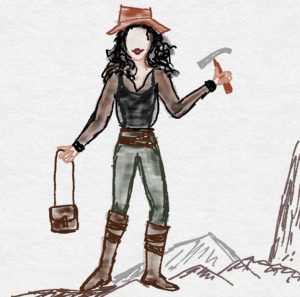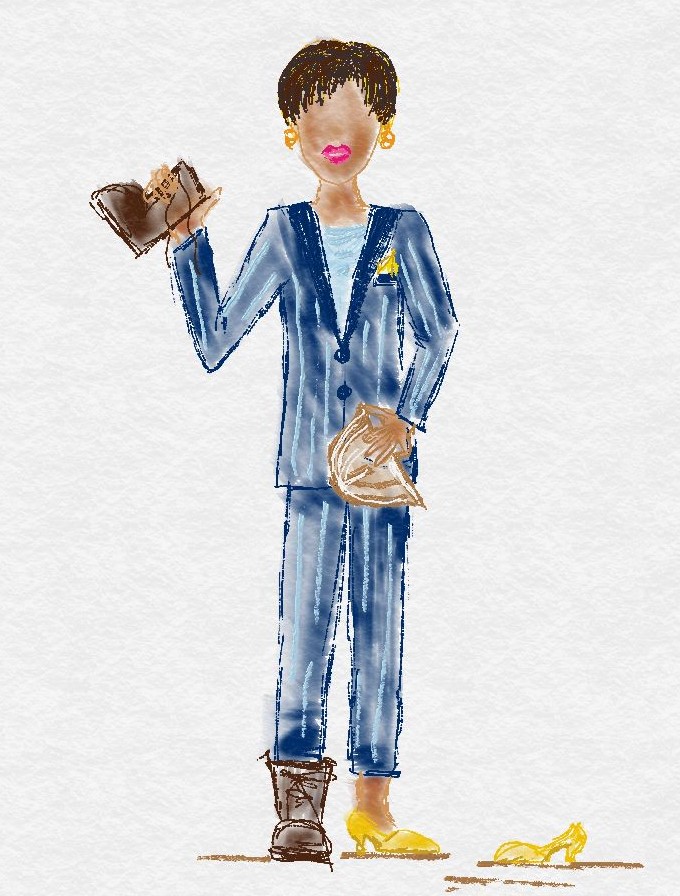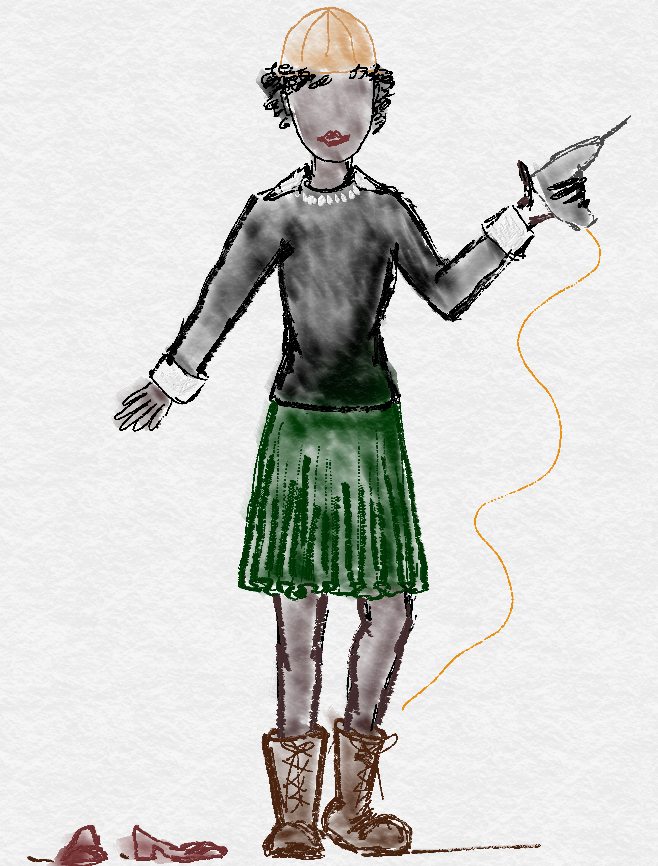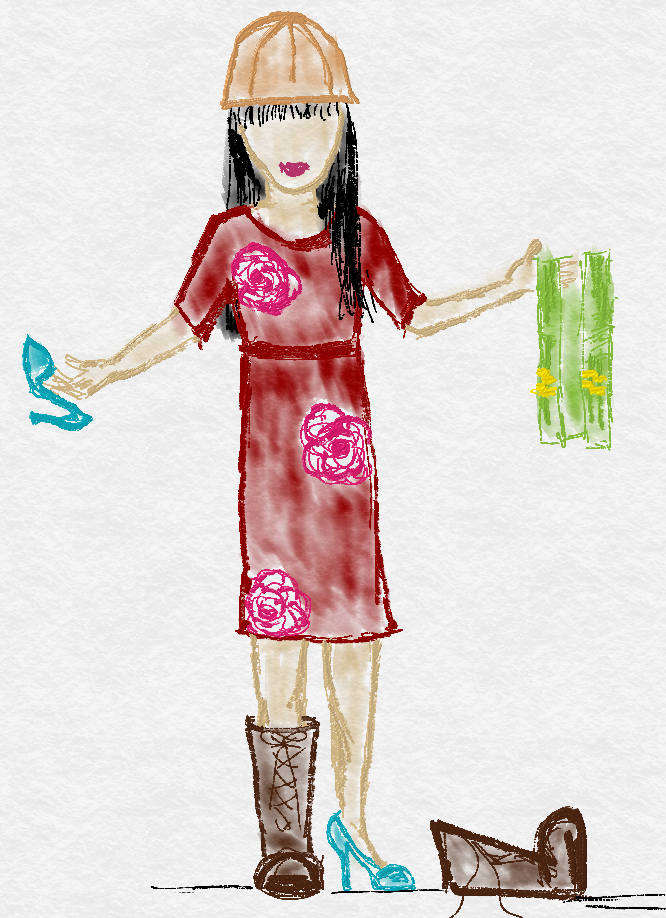Leadership
Special Gifts
Inspiration is a Great Gift Idea

I count the last part of 2019 as a time in which we received a bounty of gifts to renew our hope in making the workplace equal for men and women. I’m not talking about anything related to #MeToo or TimesUp. These gifts were outstanding women setting fabulous examples for the rest of us. Did you notice? If not, allow me to elaborate.
In mid-November, I got into my car one day and turned on the radio. If I had known the impeachment hearings were being broadcast live, I probably would have switched to the classical music station. I hate to admit that, because I’m constantly torn, feeling like I have a responsibility as a citizen to know what’s going on. But – ugh. Just ugh. The unending bickering between self-absorbed people who are only interested in keeping their own jobs is just exhausting. If these narcissistic politicians who dominate the microphones actually cared about the country, the situation would be completely different, but here we are.
So, I flipped on the radio and was immediately met with the carefully modulated tones of Marie Yovanovitch. The former Ambassador to Ukraine and longtime Foreign Service member was in the middle of her opening remarks, and I was mesmerized. She articulately described her long work history, a resume that included multiple incidents where she had to flee a location under gunfire. Her words and demeanor made it clear that she was a consummate professional and that she did what she did because she believes in our country. Her commitment to protecting and advancing the U.S. through sound foreign policy was obvious.
As members of Congress began to question Dr. Yovanovitch, the subject of her dismissal from her diplomatic position by the President of the U.S. arose. Multiple persons brought up the fact that the President said negative things about her to representatives of other countries, and he had put out ugly tweets about her during the hearings. She went to respond to this subject – the subject of the abrupt end of her sterling career – and I heard her voice start to waver. As she became obviously emotional, I instantly yelled, “Nonononono!” at the radio. You CAN’T get emotional when you’re confronted if you’re a woman. We all know that, don’t we? They’ll use it against you, whomever they happen to be. Don’t show that you care. Never show weakness.
But Dr. Yovanovitch went on in the same manner, and the effects were simply, unexpectedly wonderful. Most of the hearing participants already were blatantly hesitant to say anything negative to someone with such an admirable background. Her display of emotion just brought it home. Instead of going in for the kill, the questioners appeared to realize just how tragic the situation was and how much Dr. Yovanovitch had given for the country they were supposedly trying to save with their hearings and fighting and grandstanding. Her emotion was absolutely appropriate and served to prove the depth of the commitment she had already described.
I learned something in that moment. Yes, we still have to be careful about making sure ignorant men in the workplace don’t perceive us as “emotional.” But we can’t let that keep us from expressing true emotions, particularly when they are well-placed and help people to understand our positions and beliefs. Through her example, Dr. Yovanovitch proved something to the women of this country – you don’t have to hide your emotions and pretend like you don’t care to be taken seriously.
A few days after Marie Yovanovitch testified, I again unwittingly turned on the radio during the impeachment hearings. This time, former National Security Council member Fiona Hill gripped my attention from her first sentence. She was in the process of clarifying that, in case anyone was still misunderstanding, Ukraine did not interfere with the 2016 election, Russia did. She didn’t hedge her statements or keep them general enough to cover potential gray areas. In effect, she said, “Look, you idiots. Russia interfered in our election in 2016 and they are on track to do it again in 2020. This is not in question, and if you don’t get your heads out of your asses you’ll pay the price.” It was FABULOUS. She did not care if someone thought she sounded “too masculine” or if she might be perceived as a bitch. She had plenty of experience to know what she was doing, and she had the data to back up her beliefs. She was doing her job. Let me repeat that – she was doing her job. The strength of her convictions and her own knowledge were sufficient weapons to let her do what she needed to do without worrying about what anyone thought about her delivery or her qualifications. As someone I know said, “That woman is a badass.”
As the questioning continued, Dr. Hill did something that gave me a chill. She addressed a situation in which she was wrong. She stated that she was wrong, and she explained why she had drawn erroneous conclusions. She didn’t over-apologize, and she didn’t take the entire blame for everything that had ever happened to the world. She explained and moved on. I was in awe.
Again, I learned something. At some point you have to forget about “leaning in” and “seizing your power” and “being sensitive to others’ preconceptions.” Sometimes you have to just do your job. If you’re doing it right, and your eye is on the task at hand, all of the rest of the socio-political crap will be unimportant. And if you make a mistake, own it, explain it, and move on. Don’t give your detractors more ammunition by making too much of your mistakes.
The last ray of inspiration came in a dark movie theater in December watching “The Rise of Skywalker.” I should mention that I was a huge Star Wars fan as a kid, and I related to the fact that Princess Leia worked hard every day amidst nothing but a sea of men. No eyebrows were raised in 1977 when she was the only real recognizable female character in a string of three epic movies that included casts of hundreds. What was remarkable then was that the princess was written as a character with power. People listened to her. Even though the men came to rescue her on a couple of occasions, the rescues were necessary because she was in the thick of the battles. She wasn’t carted off as a prize; she was captured and tortured for information because SHE KNEW IMPORTANT THINGS. In the late 70s and early 80s, there weren’t very many female leads that fit this bill, so she was my hero.
On December 19, 2019, I got to watch the latest installment of the series. Like everyone else, I was burdened with the knowledge that Carrie Fisher died before the movie was made. Unlike the early films, the most recent movies have been full of strong female characters, including generals and mercenaries and a woman who could be argued is the new hero of the saga (Rey), so it could be thought that Princess Leia wasn’t so important anymore. But she started all this, and her place in the story felt personal. It has been widely publicized that the movie producers were able to use old footage of Carrie Fisher to keep her character in the movie, so I’m not giving anything away when I say that I felt something of a triumph when she came onscreen to give orders or to advise Rey. As the movie unfolded, I’ll admit that I was a bit choked up and mentally said to Princess Leia, “We did it. Look how different everything is now. And it wouldn’t be if you and I and a bunch of other hard-headed women hadn’t worn ourselves out making sure all these other women could be here.” Although I did nothing to defeat the First Order, I still felt a small victory. Little girls watching the movie now don’t have to think that a male-only work world is normal.
Now 2020 has started, and I feel like we have some positive momentum. I’m looking for more sources of inspiration and hope and progress, and I hope you are, too. Let us know if you have seen a ray of light that we’ve missed. We all need the sunshine to thrive.
(Note: If you did not hear or see any of the testimony of Dr. Yovanovitch or Dr. Hill, I recommend you watch some of the coverage. Both women were rock stars. And I strongly recommend that you watch Star Wars: A New Hope, The Empire Strikes Back, The Return of the Jedi, The Force Awakens, The Last Jedi, and The Rise of Skywalker, if you haven’t already. Skip Episodes 1-3 of the series, as they are overcomplicated, convoluted messes that do not contribute to the narrative).
Are You Sure About What You Didn’t Say?
90% Ready for Change, 10% Irritated

By Guest Contributor Lori Simpson, (who we’re 90% sure is CGG (Chief Geotechnical Genius) at Langan)
On a recent conference call my headset microphone wasn’t working and I couldn’t speak. Many people on the call didn’t notice the difference, well, because how often do women speak up on conference calls…or in meetings for that matter? Ok, ok, don’t get indignant. Of course we women speak. Some might say we are Chatty Kathys (no knock on Kathys) or that we “pick a little talk a little, pick a little talk a little, cheep cheep cheep talk a lot pick a little more.” (Any fans of the Music Man? I played Miriam’s mother in my middle school production). So how did we women get the reputation for talking too much when we don’t speak up enough?
They say that a woman needs to be 90% sure about something before she speaks up but a man only needs to be 10% sure. I see this in meetings all the time. When I was a junior engineer, I would go to meetings with a senior engineer (male, obviously, as there were no female senior engineers in my world). I would practically kick him under the conference room table because of some of the stuff that would come out of his mouth. No, he wasn’t being disrespectful; he was saying things that were flat out incorrect. As the junior engineer, I knew the details of the project,so I would know when he was wrong. Later, as I became the lead geotechnical engineer… (I’m not going to say I was senior, because well, that would speak to my age and we aren’t going there in this post…although there has been some previous discussion about my age, and I will speak to that in another post someday)…okay, where was I? Oh yes, being the lead engineer and sitting in meetings. Every time a question came to me I would take time to think and slowly respond with an answer that had a lot of qualifiers: “if”, “likely”, “might”, “could”, etc. Basically I knew there there was not an absolute answer (in geotechnical engineering there never is), so I made it clear that I was not asserting one definite position. So often in these meetings I would get a sense of dissatisfaction about my response. I think I was dissatisfied too. How come I couldn’t give a definite answer like EVERYONE else in the room? Note that everyone else was male (I’m sorry if I keep stating the obvious…but hopefully it’s not that way now so our younger readers might not think it’s obvious). It wasn’t because I was shy. It wasn’t because I felt like I shouldn’t be there. It wasn’t because I didn’t know what I was doing. So WHY?
At one point I attended a conference called Groundbreaking Women in Construction. This conference is alive and well and you should go. And while you are there, call me because it’s always in SF and I would love to meet you for a drink. But I digress. I attended a panel on the different leadership styles of men and women. This was the first time I had ever heard about this -what? Men and women are different? This was an eye opener. I mean, I grew up in the era of Men are from Mars and Women are from Venus, but I had never read it, and I didn’t think it applied to the working world (maybe because I had never read it?) One of the things that was presented was that women need to be something like 90% sure and men need to be only 10% sure before speaking up. GAME CHANGER!
I knew that when the senior engineer spoke incorrectly, he was saying what others wanted to hear—a confident answer. I also knew that he didn’t know all the details so he couldn’t give the entirely correct answer. What I didn’t know was that him knowing just enough about the project meant that he felt confident to give an answer. After that conference session, I noticed what was happening. All the men in the room knew just enough and spoke freely and sometimes incorrectly. The women (ok, woman) in the room wasn’t always 90% sure so she didn’t speak up…or when asked, gave an answers with lots of qualifiers so that the 10% she didn’t know was covered.
So does this mean that the outcomes of meetings with all or mostly men are based on an inadequate amount of information? Does it mean that the wrong conclusions are made? I would say generally no. Maybe it takes more meetings to get to the final answer because if you only know 10%, it might take you 10 meetings to get to the solution. And because women aren’t speaking up, even though they know 90%, they aren’t helping everyone get there. I don’t really believe in this math, but it makes me wonder -should men be more prepared and consider their responses before they give them? Or should women be more willing to “go out on a limb” when they don’t have all the information? On the one hand it seems obvious that the men should be more prepared and only speak up when they know more about the subject. And if a woman actually speaks up, you should put 9 times more weight on her answer. But I think there is value in the “brainstorming” method that I think occurs in meetings with men.
Ultimately, my observation is that people want you to speak up. They want to hear what you have to say. You are there for a reason, hopefully at a high billing rate, so contribute. You can put in an “if” or a “likely,” but they want you to sound confident. You might give the reasons why it is not a sure thing. Or you might say that this is the way you think it should go but there are some risks that you can explain. Either way–be confident.
After I heard the 10%/90% philosophy, my competitive nature erupted and now I try to speak up in meetings just to compete with the men for airtime. I watch how interruptions are made and how they speak over each other and join in the fun. And as long as I know at least 10% about what I am talking about, I’m on equal ground.
Confidence of a Higher Order
Yes, I’m Supposed to Be Here

Confidence is a subject we have covered extensively on this forum. It should not be a surprise to anyone currently engaged in our dialogue about women’s issues in a male-dominated workplace that a lack of confidence runs rampant through our ranks. Yes, there are women who blaze a trail unencumbered by self-doubt, and they are our heroes. But the rest of us continue to wage a battle for our place in the working world with compromised armor.
I am always fascinated by those women who sail through sexist-infested waters with no apparent recognition of the doubters and haters around them. These are the women who don’t hesitate to state their opinions, do their jobs, and tell any obstructionists to get the hell out of the way. So I study them in hopes that I might learn their secrets. No retraining orders have been filed thus far, so apparently my approach has been anthropologist-worthy. In any case, I have observed some of the most inspiring attitudes from a completely unexpected source.
The first twelve years of my education (plus kindergarten) were overseen and influenced by Roman Catholic nuns. My grade school nuns were Ursuline Sisters, and my high school nuns were Sisters of Mercy. In addition, my great aunt was a Sister of Charity. I still deal with nuns from a number of orders regularly at church and through charity work. I have the utmost respect for the dedication, work ethic, organizational skills, and focus of nuns as a whole. (I left out integrity, honesty, humility, etc., because I think those are givens). I’m also in awe of the fact that they tolerate spending their whole lives in boring, sensible shoes. That’s grit.
I cannot recall a single nun who appeared to be tentative or lacking in confidence when it came to executing her duties. Yes, I have known sisters who were shy, but the vast majority in my experience have been downright commanding in their work lives. I certainly never saw a nun defer to a man simply because he was a man. Surely you have seen or heard jokes about drill sergeant-like nuns as teachers? Plays and musicals have been written about hard core, rigid nuns issuing orders and demanding respect from masses of obedient students and adults alike.
If you read the Outlander books, (and if you don’t, we cannot be friends), the author, Diana Gabaldon, wrote a passage in which the main character reflects on where she learned to have a commanding presence in her role as a battlefield nurse during World War II. She observed nuns ordering soldiers around who were twice their size and gaining cooperation by not accepting anything else. She learned by their example that if she barked an order and acted authoritative, many men would simply comply. In a major role in one of the books, the Mother Superior of a hospital in France directs men and women about equally, never giving either subordinates or colleagues the opportunity to disagree. The character would be called “fierce” in 2018, and she serves as inspiration for the heroine when she needs to marshal her courage.
It might seem a bit counter intuitive to look for help with confidence from a group of women whose very vows could be perceived as subservient. They do not attain positions of commercial success in our society. They are forbidden from accumulating wealth or possessions. They are committed to advancing the work of their order and the church instead of their own desires.
But nuns are also some of the smartest and most well-educated women around. Sister Mary Prisca Pfeffer, my former high school principal and English teacher, died at the age of 96 with more college degrees than I could count. My great aunt insisted that my dad speak only in French during the summer so he could learn the language better. And these two examples are just the tip of the iceberg.
So where does their example leave the rest of us? More importantly, how do they achieve such confidence, and where can we get some of that?
Of course, part of the answer must include the fact that the sisters believe God is on their side. How can you not go about your work with forcefulness and aplomb when you believe that your mission has divine approval?
But beyond the obvious, I feel that many nuns stride purposefully through their vocation because they truly believe they are supposed to be there. Well, of course they do, you say. That’s no revelation. Otherwise they wouldn’t have taken vows and devoted themselves to the lives they have, right? So, if they believe so strongly in their rightful places in their roles, why don’t we?
History, of course, is one answer to that question. Nuns have filled the roles of nurses and teachers and missionaries feeding the hungry for years. They don’t have to overcome the fact that there were few, if any women in their roles 50 years ago. In fact, nuns are all women!
But what if we borrow their attitude? What if we simply decide we’re supposed to be here? We adopt that don’t-waste-time-arguing-with-me-because-it-won’t-do-you-any-good demeanor and make those around us believe it?
Before I learned that it was okay to be my age (see this post) I often joked that I graduated from college in 2007. I have told many people that others will be believe even something improbable if you look them directly in the eyes and sound confident in your statement. Actually, that’s usually true. So what if we just deal with others in the workplace every day as if it’s understood that we should be there (BECAUSE IT’S TRUE), and completely tune out any doubters. It would be even more fabulous if we could slap the knuckles of all of those doubters with a ruler, but I think there might be various local and federal laws against that.
I urge you to try the “Nun Approach” in your workplace this week. Of course it should be accompanied by all appropriate courtesies, particularly if you work anywhere that could be construed as southern. (“Yes, sir, you have inadequate clearance around your rebar for shafts C12 and F7. Those need to be fixed ASAP or your concrete is going right back to the plant. Thank you for getting this done right now.”)
The most important part of this plan is the change that will take place in your own head. If you don’t let anyone else stop to question your presence in your job, you’ll forget the question it, too. Sister Mary Prisca NEVER let anyone question her authority or her expertise, and she was right. I can diagram the previous sentence for you as proof. So we need to put her and other sisters on a pedestal and follow their lead. We’ll just wear different shoes.
Revolutions Don’t Happen When Everyone Is Happy
Are You Uncomfortable?

(Warning: This post contains a slang word that may be offensive to some. It should be offensive to all).
Last week I was sitting in an uncomfortable chair, being assaulted by a stranger’s cell phone conversation overflow, and mourning yet another precious few hours of my life that were forever lost while waiting for a flight at the Dallas-Fort Worth airport. I have spent enough time being distracted and bored in that place that I am convinced the ghost of my youthful enthusiasm roams the concourses when I’m not there.
Two airport workers, both men, took seats next to me on an apparent break. They chatted and laughed, calling out to other workers they knew as they walked past. One employee in particular strolled over to spend a good 10 minutes describing how badly the work was going where he was assigned. He moaned and groaned about delays and %^$#ups, repeatedly saying that he was sure the trouble could be traced back to the woman who was in charge of scheduling for the project. Finally finished complaining, he went to walk away and the first two guys tried to give him some words of encouragement. He shook them off and said, “Oh, it’s only going to get worse. You ever worked with a beaver before?”
I was shocked – only that he had the nerve to make such a statement in front of so many airline customers. Surely he would fear someone lodging a complaint?
On the other hand, his statement itself didn’t surprise me at all. It was not the first time, nor the fortieth time, I have heard some variation on a remark like this. And although “sensitivity training” has become commonplace in many workplaces, I can’t say that the frequency I hear such comments on construction sites and in engineering offices has decreased. The offenders now just preface their remarks with, “Well, I’ll get in trouble with the sensitivity training people if I say this, but….”
This is reality. Most women in our field can say they have experienced some degree of this type of behavior, if not worse. Many women in our field also can give lengthy recitations of less blatant, but similarly intended, slights, insults, and otherwise ugly occurrences. Thankfully, the landscape appears to be somewhat friendly for many women now, particularly younger women. No doubt corporate culture has evolved to an awareness of gender issues that has reduced the amount of discrimination, be it overt or subtle, that some women experience on a daily basis. But serious issues still persist, or we would not have this blog, and you would not be reading it. In order to eliminate those problems, we must be willing to be uncomfortable.
Several months ago, I was having dinner with a colleague, a seasoned professional. Someone else mentioned Underpinnings, and he said he was all for promoting women in our field. He then went on to say he had attended a dinner intended to introduce women to other professionals in their workplace. He said it was fine until two of the women started talking about dresses. Dresses! He was appalled. How could these women expect to be taken seriously if they acted like, well, women?
Normally, my Southern-bred manners would have required me to just gloss over this comment and change the subject. (Do not make dinner unpleasant under any circumstances). But I felt there was an important point to make with an influential person. So I asked him, “What’s wrong with talking about dresses? Do we have to pretend we’re not who we are in order to be accepted as engineers?” The question took him aback. He didn’t really have an answer. I could only hope that he would continue to ponder the issue after he left, coming to a more enlightened position on the matter.
The point is that ignorance and hostility will persist if we are not willing to make ourselves uncomfortable to effect change. This example was a mild one, but perhaps more in keeping with common occurrences many professional women experience. The more hostile conditions and situations require more aggressive action. If we as individuals are not willing to create a stir, or make someone else unhappy, or be labeled as a troublemaker, the offensive activities will continue. Cheerleading and commiseration only go so far. Acknowledging those who support us is great, but ignoring those who don’t won’t make them go away.
Certainly, the conditions for women in our field are better now than they were 25 years ago, and outstanding compared to what existed 50 years ago. But the man in the airport is proof that we’re not in Candyland yet. And if you think that his blatant misogyny and your issues with getting promoted in your office aren’t connected, you are putting your head in the sand.
Those of us in the Over 40 crowd can say that we have had to fight a lot of ugly battles to get where we are today. And those of you in the Under 40 crowd have a better set of circumstances as a result. I can say honestly that I once was locked in a job trailer with a large aggressive jobsite superintendent who had decided it was time I put out. I was told in a progress meeting in front of 30 men that I wasn’t going to decide what concrete was good or bad, “…just because you swish your ass in front of everyone.” And a former boss decided that sleeping with him was part of my project duties. Each of these situations caused me to have to take a stand and risk being labeled as a trouble maker. But each instance was wrong, and I hope my discomfort caused change that allowed some other women to go about their business without similar problems.
During a number of other times in my career, I chose to act as though there were no problems. I thought if I acknowledged the issues, it would give the opposition, or even my boss or my clients, a reason that a woman should not be in my position. I believed that if I concentrated on getting along with those who appeared to support me that I could eventually win everyone over to my side. But human nature is not so malleable, and men who are aggressively opposed to women having responsibility are not going to be persuaded by good manners and a plate of cookies. Sometimes you have to call out the injustice. Sometimes you have to declare war on the hate. It’s not pleasant, but real changes in cultural myopathy rarely are accompanied by teddy bears and candy canes. A committee meeting is not going to stop that knuckle-dragging evolutionary hiccup from referring to his female co-worker as a beaver. Revolutions don’t start when everyone is happy.
I truly appreciate all of the men who support us, and I’m grateful for the strides that have been made to create a professional environment that is more welcoming to women today. I also hope that those same women who are benefitting from struggles in the past are willing to go to bat for themselves and others who are in situations in the present that are still far from perfect. If you won’t speak up and say you don’t like ham sandwiches, don’t complain to your friends that lunch is never any good.
Patterns for Success
Respond, don’t React
by Mia Painter, Guest Contributor

I was raised in a small family of women – mom, gram, two aunts, and a few cousins. My family had started out with some men, but the year I was two my grandfather and uncle died and my mom left my abusive father. I remember the women around me as strong, self-sufficient, generous, flexible, but only at times sensitive and outwardly loving. They all encouraged (and expected) me to do chores (lots of cleaning and mowing the lawn), to explore (keeping pet worms and having areas of the yard I could turn to mud factories), and to stand up for myself. Most importantly, I think, to who I am today – they expected me to do what I wanted to do, regardless of what those around me said. But here’s what I’ve been pondering lately…I think what I took from their lessons was to react, not to respond. My pattern of reaction (and not response) led me to where I am in my career. I’m (generally) happy with how my career has worked out but I wonder how it would have been had I responded more and reacted less. So now I’m starting to look at how I can respond to career situations and move forward with intention, not just reacting to situations with a gut reaction.
Reacting is what we instinctually or quickly do when an event or a decision or a confrontation happens. To me, reacting happens when I see something unjust or am exposed to a hard situation – and become angry or defensive or hurt. It also occurs when I see something as a challenge and charge forward to meet it head-on without much forethought.
Responding takes more effort and involves thinking things through. Responding means I keep my calm, think about what happened, and make an active, conscious decision about the best course of action (or inaction) to take. Responding isn’t always slower than reacting (though it certainly can be) but it is always about seeing a bigger and different perspective around the situation.
The most vivid memory of me reacting as a kid was in kindergarten (although it’s one of those memories that is now warped by my mom’s telling me about it so many times, so it’s a blend of my memory plus her story). It was free time and a boy (Brad) told me I couldn’t walk on the desks. Now maybe he meant that I shouldn’t, or that it wasn’t appropriate to stand on desks in school. But I heard him tell me I couldn’t do it and so I immediately took it as a challenge. I climbed up on the little kindergarten sized desks in my Catholic school jumper and walked around from desk to desk while the class looked at me in surprise. As you can expect, I was told to get down and to go to the principal’s office. My mom came to pick me up and asked what happened. I said Brad told me I couldn’t walk on desks and so I did. She told me good, that’s what I should have done! (And then followed it up with a discussion about appropriate times to walk on desks – i.e. not in class.)
Flash forward to college…end of my sophomore year and I had taken a variety of general classes but had not yet declared a major. My advisor told me I needed to pick a major now. I made my decision there and then in his office, and chose geology. Don’t get me wrong, geology is a good fit for me, but I didn’t do any long-term planning – I didn’t do any of the things I’d advise anyone who was choosing a career! I didn’t research options, would I need a master’s, what field of geology would I go into, what geographic region would I live in? I had taken “Geology for Consumers” the prior semester and it had included a field trip (as all good geology classes should). But something sparked in me that day when the class got out of the school van on the side of a road on top of a hill (all very much a typical day). That was the day I learned that I wasn’t just standing on a hill…I was standing on a drumlin! (A drumlin is an elongated hill formed by glaciers.) The hill got there somehow. The valley got there somehow. There was a process, a history, a predictable order to the landscape around us. I’m pretty sure that’s what my gut reaction was stirring up months later in my advisor’s office.
Ok, so I chose geology as a major. A year in and my new advisor suggested I double major and add in geophysics. I saw it as a challenge and agreed right away. Agreeing meant adding a year onto my undergraduate work, and it meant taking a slew of math and physics classes as well as geophysical coursework. Then I chose a graduate school and landed into the research that my advisor suggested. I was content, happy even. I got a job, moved, got married, had two babies, and kept working. All of this just happened as a series of my reactions to events that presented themselves to me. Each time I took the next logical step from where I was at any given moment.
But now I’m trying a different way. A few years ago while struggling with a loved one’s addiction, I learned the phrase “Respond, don’t React” and I applied it consciously in all aspects of that relationship. It helped me distance myself from the craziness of addiction enough to take care of myself. I eventually could see my loved one with a different perspective and it helped me continue to love them even amid the craziness. It helped me feel calmer, more in control of myself. In the past year I’ve had some challenging interactions with clients and staff, and one day the phrase “Respond, don’t React” came to me again. I realized I could apply this to my career as well – mainly in my day-to-day interactions to keep my calm and not do anything I’d regret!
Now I’m looking at my long-term goals and I’ve had the revelation that I can respond in situations and with decision-making to lead me to those goals. It had never occurred to me before the last couple months to me to write down career goals, and then to actually do something to achieve them. I’m not sure why this concept wasn’t part of my life to begin with – seems like it should be standard…have goals, do things to achieve them. But I can see now that a lot of my childhood was observing the women in my life reacting to their situations – grieving, moving on, getting out, raising kids, making ends meet. So many years of just doing the next logical step led me to this place, here, right now. It’s a pretty decent place. But now I want to try responding to the next career crossroad, situation, choice, and goal.
About me:
I’m a geologist and geophysicist for a civil engineering company. Much of my thoughts lately (when not focusing with all my might to meet deadlines, or to snuggle my boys, or to not be late for date night with my husband, or to keep our pet goldfish alive) are looking at how the decisions we all make shape our careers and the careers of those around us – particularly for women in an industry with mostly men, and for men in an industry with only a few women. Thanks Helen and Peggy for having me be a guest, it felt nice to have thoughts and to then write them down! Maybe there’s a pattern here.
Our Sacrifices, Their Future
Driving Toward the Future
by Ann Schmelzer, Guest Contributor

Did you see the Super Bowl Audi commercial with the young girl driving the boxcar? Here is the link in case you missed it: https://www.youtube.com/watch?v=G6u10YPk_34
The commercial drew some criticism in its pre-Super Bowl preview; Audi North America only has two women in senior leadership positions and no women on its senior management board. That being said, they still spent millions of dollars to make a statement, and are following up on that by committing to 50 percent of their graduate internships going to women. I hope that broadening of the initial candidate pool causes a ripple effect all the way up the chain.
Setting that aside for a moment and focusing on the commercial itself, it caught me off guard. Sandwiched in between commercials that were loud for comedic value, this was quiet and stirring. I was immediately pulled in by the beautiful camera work and the isolated string music.
Outside of my day job in a “dirt adjacent” field, where I am typically only one of a few women in the room at any given time, I am a soccer coach. I have to say that, however gender-skewed my day job is, my extracurricular choice is downright barren. I’ve been coaching for over eleven years now; I can still count on one hand the number of female coaches I’ve coached against.
I get asked by friends and family all the time when I’m going to hang up my coaching cleats. To be fair, they have a point. The spring season starts with winter training indoors in January and goes through mid-June. It requires somewhere in the range of 20-30 hours per week, and let’s not discuss the amount of additional time in the car between training, games, and tournaments.
By May of each year, things are usually spinning out of control on the home front. Groceries? What groceries? When is the last time I mopped? Dangerous question. That’s not dust on the entertainment center, they’re unicorn sprinkles… whatever I need to tell myself. That circumstance inevitably drives the question from those who know and love me, “Annie, how long are you going to continue to do this? Your job (subtext: the thing that pays your bills) is really demanding. Do you really have time for this?” I usually mumble some version of “I don’t know and, in the meantime, I’ll try to pin down one of the garden gnomes to see how he feels about scrubbing toilets.”
I’ve never had a smooth answer to this question. The further I get into my career, the more it comes up. I think the commercial grabbed me in the way that it did because I have known dozens of little faces just like that girl in the boxcar– hopeful, determined, sweaty, dirt-stained faces. I want those faces to know that there’s someone out there who looks like them and is also determined, nervous, and trying to navigate triumphantly.
I have coached against a lot of guys; it can be a very testosterone-fueled experience– coaches yelling at their players, yelling at the referees, sometimes yelling at me when I deign to push back on a bad call or a late tackle. It gets lonely. Week after week I show up to face another coach who thinks he knows better than the girl coach sitting on the opposite bench. I’m quiet on the sideline. My girls know that I do my talking at training and games are for them to show me and themselves what they’ve learned. Of course I’ll make tweaks or share some encouragement, but that is rarely what I see on opposing benches. That’s not to say that they aren’t good coaches with lots of experience, but it’s interesting (and occasionally horrifying) to me how that can and does show up. This isn’t an “us vs them” commentary, it’s simply a reminder to me that hopefully there’s some value in a dust-ridden entertainment center and a pb&j for dinner more nights in a row than I care to think about.
No coach is going to be perfect. I once read that “a coach can make a team 10 percent better or 30 percent worse”. I really believe that. I also believe that the world belongs to those who show up. Maybe next time I get the question about when I’m going to stop coaching, I’ll share this commercial instead of muttering about garden gnomes and toilet bowls. Really, is there more of a reason needed?


